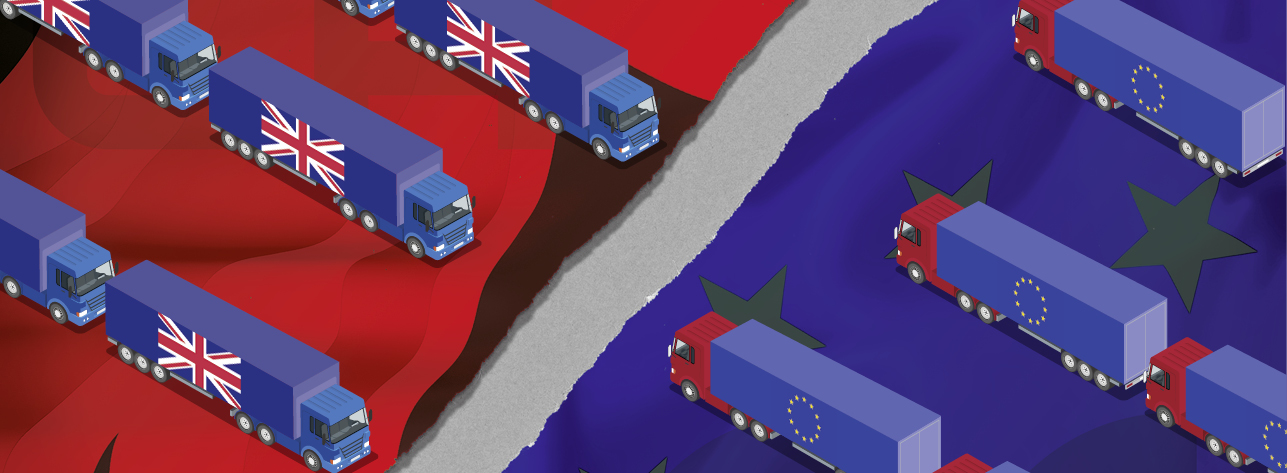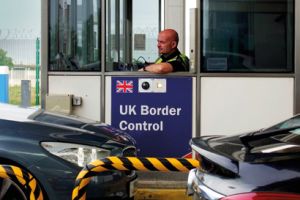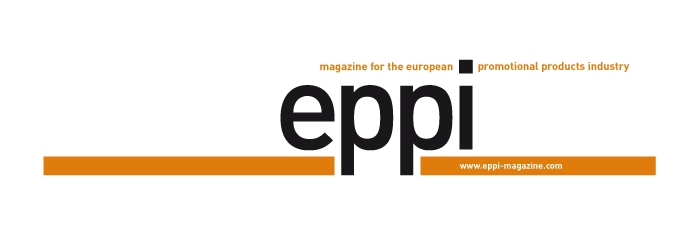After the Brexit transition period came to an end last year, there has been a customs border between the EU and Great Britain since January 1. The resulting bureaucracy is placing an extreme strain on the pan-European supply chains and the relationships between the trading partners. The last-minute trade agreement hasn’t alleviated the situation much. eppi magazine spoke with British and other European promotional products players about the new reality.

Boris Johnson is not a politician, who is known for demonstrative modesty or understatement. So the words the British Prime Minister used to introduce the Trade and Cooperation Agreement between the European Union and the United Kingdom that was finally concluded on December 24, 2020 after endless, tough negotiations and which was signed by the EU on December 30, were pretty pithy: As it says in the foreword, “Next year will be our opportunity to show what Global Britain can do, reasserting ourselves as a liberal free trading nation and a force for good in the world” and “It is my fervent hope that this Treaty, rooted in Britain’s sense of itself as a proudly European country, will help to bring people together.” At the moment, however, the situation in the United Kingdom and at the EU borders is showing a completely different picture. After the end of the transition period, Great Britain conclusively left the EU on January 1, 2021 and there is now a border where goods were previously able to pass everywhere into the EU – the result: long queues of trucks at the border crossing points at the start of the year, massive delays in deliveries and a huge amount of red tape. The economic aftermath became tangible immediately: According to Eurostat, the EU exports to Great Britain declined by 27.4% in January compared to the previous year’s month, the British exports to Europe by no less than 59.5%.
False start

Long truck traffic jams at the borders caused enormous delays in deliveries, especially at the beginning of the year.
This huge loss is in some cases due to the fact that many players simply had too little time to prepare themselves sufficiently for that historical day in question. There had been too many unanswered questions right up until the last minute in spite of the one-year transitional period with initially the still “normal” movement of goods. “No one could really prepare properly for the outcome of Brexit, with all the uncertainty and lack of detail provided,” reported Prama Bhardwaj, CEO and founder of the London-based textile firm, Mantis World. “The trade agreement between the UK and the EU was made with very little time for businesses, advisors, logistics companies and government revenue authorities to understand the true implications and requirements. This created chaos at the start of this year for both sides.” The past months have thus been an immense challenge for British companies that trade with the EU. “It has been very difficult from the start,” stated Adrian Zralka, Managing Director of Eco Promo. “We tried to prepare as much as possible with commercial invoices, EORI numbers and commodity codes as advised by couriers and freight forwarders. But after over three months it seems that this did not make much difference to the speed at which our goods have been processed and delivered to the EU.” Because the largest bottle neck lies in the logistics and the processing at the borders. Many forwarding companies had not been anywhere near amply prepared for the new situation and are still in a very difficult financial situation. “Now that we know what is happening and have set ourselves up with the relevant authorities, the cooperation and communication with warehousing and logistics providers is our biggest ongoing challenge,” reported Mike Oxley, CEO of the promotional products agency, Prominate UK. “Many are in a big mess and still ‘on the back foot’ with Brexit and COVID-19.“ “We quickly came to realise that the experts in this field had as much information as we did,” added Bhardwaj. “Over the last few months, thanks to cross-industry sharing of knowledge, we have come to understand more about moving goods across borders.
However, this cannot be the most efficient way for the UK to trade with its largest trading partner in the long term.” Of course, suppliers from the EU are also faced with challenges regarding how to send their goods to their British customers the same way they have done so far. Patrik Kaiser, Sales Export Manager at the German confectionery supplier, Kalfany Süße Werbung, reported: “The impact of Brexit is particularly tangible in the logistic sector. There is also great uncertainty among the British distributors regarding the processes and effects of customs clearance. We are still struggling on queries regarding delivery delays and additional costs due to the customs clearance, since we are only gathering initial experiences ourselves at the moment. One problem that is also presently arising for us as a supplier of edible promotional products is that many British forwarding companies are currently not accepting deliveries of foodstuffs.”
Limited freedom
The Trade and Cooperation Agreement is a compromise that in the opinion of many of the parties involved doesn’t significantly facilitate the movement of goods. For example, it was agreed that no customs duties and tariffs would be imposed on goods that originate from the United Kingdom or the EU. A provision that is however irrelevant for wide sections of the promotional products market and many other sectors with globally interlinked supply chains – when Brits purchase goods from European importers – or vice versa – custom duties do apply: “The ‘Free Trade Agreement’ only ever applied to goods made in the UK being exported into the EU or vice versa. Any goods made in third countries were imposed with duty when shipped across the border. Most promotional products are manufactured overseas, particularly in Asia, and this has a huge impact on pricing,” explained Bhardwaj. “There is a substantial duty payable on goods – 12% on most clothing items. This is a particularly large blow as our countries of origin – Tanzania, Bangladesh and Pakistan – are all developing nations with their own separate duty-free agreements with both the EU and UK.
However, if we ship these same goods across the EU/UK border, this doesn’t apply and a duty has to be paid.” Oxley added: “There is limited impact on imports into the UK for goods manufactured in Europe. For goods in stock in Europe, manufactured in Asia, there are sometimes additional costs and paperwork, so there are some constraints as to what we can offer our UK clients and how quickly. Regarding exports it is a complex situation that involves us utilising warehousing in Europe, delays with shipments and additional costs for some items made in Asia. This means, for our clients, added complexity and generally a separation and different ways of working between the UK and the EU.” However, even companies that produce in Great Britain or the EU themselves, are faced with the question as to whether and if so, how they should do business on the mainland, the same applies the other way round. The case of the English cheese producer, Cheshire Cheese Company, who maintained a flourishing mail order trade with European customers up until the end of 2020 and who is now supposed to pay 180 Pounds (approx. 200 Euros) for each consignment of goods for the required health certificate – even if the value of the package sent is considerably less than this sum, attracted huge media attention on both sides of the European/British border.
Plies of paperwork

In spite of numerous campaigns that warned about preparations for Brexit, many players felt that they were insufficiently prepared due to lack of government support.
Regardless of where they were manufactured and how intricate the production process of the goods is – the paperwork for importing and exporting goods and the resulting costs are enormous. The agreement does indeed foresee simplified formalities for individual product groups – including cars, wine or medication. However, as so often, sectors with a complex value chain such as the promotional products industry don’t benefit at all from these. Instead, there are a host of new provisions that everyone, who wants to continue trading across the channel, has to wade through. For example, the rules of origin for all products one sells had to be re-documented. Based on these rules of origin, companies can derive whether they benefit from the free trade privileges laid down in the trade agreement or not. “Rules of origin are a difficult subject and trying to understand all the implications for our trade and our business was not easy,” commented Zralka. “We managed to determine commodity codes for all of our products and all the countries of origin too. Generally, we always tried to source our products from the UK or the EU and I think this will serve us well going forward.“
It was also imperative to acquire a new British or European EORI number (Economic Operators Registration and Identification) on time. Namely the old British EORI numbers lost their validity in the EU as of January 1, 2021 and EORI numbers that were issued in one of the EU member states are no longer valid in Great Britain either. The classification and categorisation of one’s own range of goods is also like finding one’s way through a maze. Every item has to be allocated its own code, depending on the material, composition and intended purpose of a product. Taking a plastic product as an example demonstrates how complicated this can prove to be: There is an own code for each polymer, however the importers and exporters also have to consider the shape, characteristics, function and underlying production methods. A number of plastic products are however not categorised using this system, instead they fall under different tariff regulations – for instance textiles, shoes, headwear, umbrellas, fashion jewellery, lampshades, toys or brushes. Further regulations apply for sets comprising of different products – which is no rarity on the promotional products market: “Where goods are presented as sets that comprise of two or more separate articles which may fall under different classification codes, they should be classified under the code that represents the primary function of the set,“ according to the provisions of the British customs authorities. Doesn’t that sound complicated? It certainly is too. “It can take quite a lot of time to get the classifications correct,” Bhardwaj noted. “Once completed they don’t require re-doing. However, inputting commodity codes along with all the information that is required for customs clearance is proving to be quite a time-consuming manual task!” Once one has completed all of this, the next task on the list is the taxation. Because the United Kingdom is no longer bound to the joint value added tax system guideline or by the case law of the European Court of Justice and therefore doesn’t have to observe maximum or minimum VAT rates. At the same time, Great Britain no longer has an influence on the development of the VAT system. Leaving the EU is thus resulting in extensive changes particularly regarding VAT, because the EU VAT law is based on the joint VAT system of the EU, which no longer applies for the United Kingdom. Finally, of course, different legal requirements apply regarding product safety and co. Even if the guidelines actually hardly differ, the conformity has to be individually certified accordingly. Double the effort is also required regarding the obligatory conformity mark: As of January 1, 2022 in the United Kingdom the UKCA label will replace the CE mark applicable within the EU.
What follows
All of this affects the delivery times, of course. “In some cases, goods got stuck for several weeks in customs facilities in various countries without any explanation as to why,” stated Zralka. “Overall, the speedy 2-3 working days delivery times are not coming back in the foreseeable future. This applies for both directions. I might be proven wrong as we all get accustomed to the new conditions.” Bhardwaj added: “Moving goods from the UK to the EU initially took us a month, due to the carriers being overwhelmed by the demand and increased workload due to customs changes. Now we all understand the process better, it is certainly more straightforward, but is still an administrative burden. Some countries seem to be easier to ship to than others – it still takes a month to get deliveries to Spain, for example.” It goes without saying that companies will not get round having to pass on the massive extra costs incurred due to the high bureaucratic effort, increased tax rates, customs duties and fees for certificates and certifications to their customers. “Prices for all products are going up – typically between 1% and 10%,” according to Oxley, and Zralka went on to say: “Costs have obviously increased, in particular for UK manufacturers that import some parts for their goods from the EU. Some of these additional costs had to be passed on unfortunately. We tried to hold the prices to stay competitive, but there are certain items where a significant increase was unavoidable.”
In the final analysis, the big danger that lurks behind the collective obstacles that Brexit is confronting the pan-European promotional products business with, is of course, the fact that the business relations are suffering or are indeed being broken off. “The biggest challenges are keeping European customers on board and explaining all the processes to them, as some of them have never imported goods from third countries,” reported Zralka. “It is a difficult conversation as lead times, bureaucracy and costs have all increased and there are no benefits that came out of Brexit. Understandably, European customers are left wondering if it is worth the hassle dealing with a UK supplier.” The same also applies the other way round, as Kaiser observed: “Due to the uncertain situation regarding deliveries to Great Britain, British distributors currently clearly prefer to do business with domestic suppliers. But this will change in time after the first experiences with successful deliveries have been made.” Close communications and good customer relations are of great benefit, as Bhardwaj noted: “We communicated regularly with our EU distributors, updating them on the status of deliveries and where we were in the process – transparency, honesty and as much clarity as we could possibly give under the circumstances. We have been open about the challenges we have overcome and what we feel we have yet to conquer and are incredibly grateful for the patience, support and understanding shown by all of our EU distributors.”
Presence on the continent
A promising solution that many UK companies are currently pursuing is to set up a subsidiary or at least a logistic hub on the mainland. For instance, Mantis World is following this strategy, as Bhardwaj reported: “We have set up a third-party warehouse in Germany and we have opened a German company so we are set to trade more easily with our EU partners. There are some advantages in this, we can now actually deliver quicker to the EU than we could before Brexit.” Eco-Promo also relies on a presence on the European mainland in order to secure its EU business: “We are currently working on setting up an office in Central Europe in order to keep our existing European business and also to have the opportunity to grow within the EU in the near future,” reported Zralka. “Doing that from the UK would be very difficult with all the aforementioned obstacles.” Oxley, who as a distributor works with suppliers on both sides of the border and who supplies both customers in the United Kingdom as well as in the EU, is of the opinion that “the pan-European trade will split between the UK and the EU. There will still be pan-European oversight but budgets will be split between the UK and the EU and ways of working will have to change. We have made some changes so that we have EU suppliers for the EU and UK suppliers for the UK, but from a product perspective, there has been limited change. However, things still have to settle due to COVID-19.”
And Corona on top
Because the ongoing pandemic is causing distortions, the economic activities throughout Europe are still more or less being kept on the back burner, which makes it difficult to identify whether declines are due to Brexit or Corona. Furthermore, according to Zralka, “Corona is making the conditions under which you try to do business and grow worse. Brexit on its own is a hard blow to most companies trading with the EU. Having such a major change happening whilst you are going through one of the worst economic downturns in history is a massive blow to our trade and to the British economy as a whole.” Colin Loughran, Managing Director of the Irish writing instrument specialists, Goldstar, assesses the situation from the view of the EU: “Goldstar’s UK core business exports declined significantly – approx. three times more than our other core markets within the last year, but this is more a consequence of the Coronavirus, not Brexit.” According to own accounts, the Irish company isn’t experiencing any problems as a result of Brexit: “Apart from the initial customs clearance teething problems, everything has been running relatively smoothly for months. For standard shipments we added an extra day as a buffer, but it now seems that the extra day might not be necessary. Express shipments still get delivered within one to two days, whereby it takes a maximum of 24 hours to around 80-90% of our UK destinations.” Goldstar ships goods destined for its British customers from the headquarters in Dundalk, Ireland via the Irish capital in the direction of Wales, as Loughran explained: “Our shipments have always travelled via Dublin to Holyhead. Since Brexit, we simply declare the goods before they ship by submitting a commercial invoice. Our shipping partners prepare an export customs entry prior to departure which allows goods to be cleared quickly as a single bulk clearance per shipment.”

In the opinion of many market players, it will take a long time for routine to become established at the new frontier.
Special case Northern Ireland
Special provisions, which aim to preserve the integrity of the EU Single Market, apply for companies, which unlike Goldstar send their goods via the Northern Irish border. At the same time, the withdrawal agreement ensures that no customs controls are carried out between Ireland and Northern Ireland and that the Good Friday Agreement remains fully intact. Northern Ireland remains part of the British customs area, but all relevant Single Market regulations of the EU as well as the EU Customs Code are imposed in Northern Ireland, whereby the necessary controls and collection of duties takes place at the Northern Irish ports. A regulation that has not only caused political tension in the historically sensitive province – the Northern Irish Head of Government, Arlene Foster, announced she was stepping down in April – but has unfortunately also already led to violent riots. “There is no business risk for Goldstar,” assured Loughran, he added however: “My concern regarding the events in Northern Ireland is personal because I grew up there and my family and friends live there. It is always a worry to see teenagers rioting in the street because it has the potential to escalate if not dealt with, particularly in Northern Ireland. I am confident, however, that the EU and the UK will find a middle ground on the last remaining issues.” And Northern Ireland is not the only region where the Brexit is causing conflicts. There was also confrontation between French fishermen and British marines off the coast of Jersey at the beginning of May, to give another example.
Questions remaining
So how will the story about the British economy and the hitherto diversified relationships between British and continental companies continue? It seems almost impossible to make an anywhere near accurate forecast. “It is hard to make short term predictions in these uncertain times, and we may not truly realise the long-term economic effects for quite some time,” commented Bhardwaj. “The UK vaccination programme has so far been a success and we are expecting an economic rebound as the country opens up at an accelerated pace. However, Brexit is just one issue causing increases in prices. Raw material and container costs have increased, as well as other costs within the supply chains. It will also be difficult to decouple the economic effect of Brexit from the effect of the pandemic. Whether the increased prices can be absorbed will depend on the strength of the underlying economic fundamentals of GDP growth, employment and interest rates, as well as how long the Government support schemes will continue.”
At least many of the market players still want to continue doing cross-border business. “We are not limiting our activities in Great Britain and want to continue to be a loyal partner for our longstanding customers there,” remarked Kaiser. “We are also convinced that smooth deliveries to Great Britain will be possible again as soon as the new customer clearance processes have become routine tasks. This already functions well with other countries, such as Switzerland, for instance.” However, in the face of the immense damage that Brexit has already inflicted upon pan- European trade it is unfortunately probable that the volume of EU/UK business will decline – primarily for British suppliers. “I believe things will settle down and there will be a ‘new normal’ for EU/UK trade“, Zralka said. “In the long-term however, I think that EU suppliers and customers will focus on sourcing products from the EU due to easier trade, cheaper costs and less paperwork. There is a good economical reason why countries generally join free trade agreements rather than leave them.”
What is the sense of it all? – many of those people, who ticked the “leave” box five years ago, might be asking themselves in the meantime. The reality on both sides of the new frontier has in any case little in common with Boris Johnson’s announcements and notions of the future after Brexit.
// Till Barth
Photos: Shutterstock.com
Interview with Carey Trevill, CEO of the BPMA

Carey Trevill
Carey Trevill: Since the end of the transition period, UK distributors and suppliers have been facing some immediate and complex challenges. The FTA (Free Trade Agreement) was concluded very late in the day and whilst we knew what was coming to a degree, the preparation time was still limited, especially as the UK was still caught in the grip of lockdown due to the pandemic. We are getting used to the new rules. However, timing and costs have changed in some instances, whilst the expectations haven’t. Carriers compounded many issues for our members and the wider industry – you will remember the scenarios at the ports at Christmas time! This has improved, but it is very time-consuming ensuring the right declarations and charges are applied.
The BPMA is in close contact with British Government officials to raise awareness for SMEs in the promotional industry. What are the biggest challenges at the moment?
Carey Trevill: That is an expansive question! For our industry, there are burdens that are expected to be carried by the suppliers and distributors, some EU member states have made it hard for UK business to trade. In a meeting on April 28, the BPMA sought the support of the UK Minister for Exports, to help him understand more about the promotional merchandise industry. Representing our members and the rest of the UK industry, we have proposed several solutions to VAT issues faced by companies that trade in the EU.
Do you feel that the special issues of our industry are being heard?
Carey Trevill: We had a very successful meeting. Presenting the Minister of Exports with the challenges faced by an adjacent industry such as promotional merchandise, the BPMA Chairwoman, Angela Wagstaff (Founder of Allwag Promotions), and the BPMA Board Member, Andrew Langley (Founder of Juniper Products), highlighted the case for distributors and suppliers. During the meeting, we also emphasised the extensive work the BPMA has done for its members to provide information, training and sessions in a bid to help members understand the new rules. We are continuing discussions with Government departments to look at solutions to help our industry sector and of course others in a similar situation.
Are there any figures that indicate to which extent exports in the British promotional products industry have dropped since January?
Carey Trevill: It is hard to break down the devastating impact that has hit every economy during the pandemic coupled with the impact – and opportunities – of the end of the transition period. Overall, the industry has reported a decline of as much as 60% in business versus a normal year-on-year business. In a recent BPMA industry survey, of those who responded, 56% reported significant challenges with customs and delays at borders. 41% reported an immediate loss of business in January. This has improved since the start of the year and our next findings are expected to show a more positive picture, however, what the true extent of loss may be still remains to be seen. On the other hand, some respondents actually reported that they had recorded an increase in opportunities during the same survey.
Are any companies considering stopping their export activities altogether against this backdrop?
Carey Trevill: Sadly yes. Infrequent exporters, who have perhaps invested less in exporting have found the process hard and costly with EU member states delaying or rejecting applications for EU VAT numbers. At the same time, experienced exporters are finding the overall cost burden very challenging and whilst there is contemplation that this will ease once some of the external factors such as carrier, freight and the correct application of charges are clarified, doing business in the EU definitely means having to invest more man hours in dealing with the new situation.
What is your prognosis for the British economy over the coming months?
Carey Trevill: This week, the Advertising Association (which the BPMA is a member of) and WARC released the advertising expenditure report; a report we closely monitor due to the impact on spending for our industry. It is now estimated that the total UK ad spend will grow by 15.2% this year to reach a total of 27 bil. British Pounds. The forecast rise will recover the decline of 1.8 bil. British Pounds experienced in 2020 in its entirety, followed by a further 7.2% rise in 2022, when the market will be worth a record 29 bil. British Pounds. The UK is on track to achieve the strongest ad spend recovery of any major global market this year and this puts the UK economy in a position to bounce back strongly post-pandemic. The market changes and dynamics we have seen over the past year have been dramatic, but with every 1 Pound of advertising spend generating 6 Pounds of GDP, the predicted growth this year of 15.2% is good for the UK and will be a welcome boost for jobs and growth in the wider economy. When we consider what role promotional merchandise plays in boosting the UK economy; we know that 1 Pound spent by an SME on promotions and merchandise will bring an eight-fold return on the investment. With the number of enquiries rising as the UK emerges from the latest lockdowns, we are cautiously optimistic but aware of a tough road ahead.
Many British promotional companies are very actively doing business in the EU, and for many years the BPMA has been helpful in building international business relationships. How will Brexit impact the pan-European trade in our industry and the ties between British and EU companies in the long term?
Carey Trevill: That is a good question, personally we are confident that our EU relationships will continue to endure. Life has changes and indeed the stance of UK business has had to change post-Transition. Many UK firms had already taken the decision to set up subsidiaries in the EU to ease trade and we can see many companies continuing to work together to deliver brilliant work for their clients. However, we may see some relationships change due to the new trading rules. The true changes in our trading relationships may not be seen in full until later this year as the world comes back online.
Which advice would you give promotional products suppliers from the EU, who want to keep on doing business with UK distributors?
Carey Trevill: We would recommend they ensure that the communications are clear from the outset. Rules of origin have had a big impact on the status of goods between the two markets and it is essential to understand the duties that may apply, the deliveries and ownership of goods. Furthermore, it must be taken into account that many areas of the world are still impacted and will continue to be impacted by COVID-19.
// Till Barth spoke with Carey Trevill. Photo: BPMA





